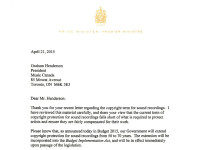The Copyright Board of Canada delivered a devastating defeat to Access Copyright on Friday, releasing its decision on a tariff for copying by employees of provincial governments. Access Copyright had initially sought $15 per employee for the period from 2005 – 2009 and $24 per employee for the period from 2010 – 2014. It later reduced its demands to $5.56 and $8.45. The board conducted a detailed review of the copying within government and the applicability of the Access Copyright licence. Its final decision gives Access Copyright pennies rather than dollars: 11.56 cents for 2005-2009 and 49.71 cents for 2010-2014.
The financial loss for Access Copyright in the case is obvious as it expected to earn millions from the tariff. With roughly 120,000 full time employees covered by the tariff, Access Copyright’s initial ask would have brought in $9 million in the first five years and another $14.4 million in the second five years for a total of almost $25 million (even its reduced ask envisioned nearly $9 million in revenues). Instead, the Board estimates that the total value of the tariff for the entire period will be $370,000, which is unlikely to cover Access Copyright’s legal and administrative costs (it also does not include revenues from the Province of Ontario, which struck an incredibly bad deal in 2011 by agreeing to pay $7.50 per year per employee).










